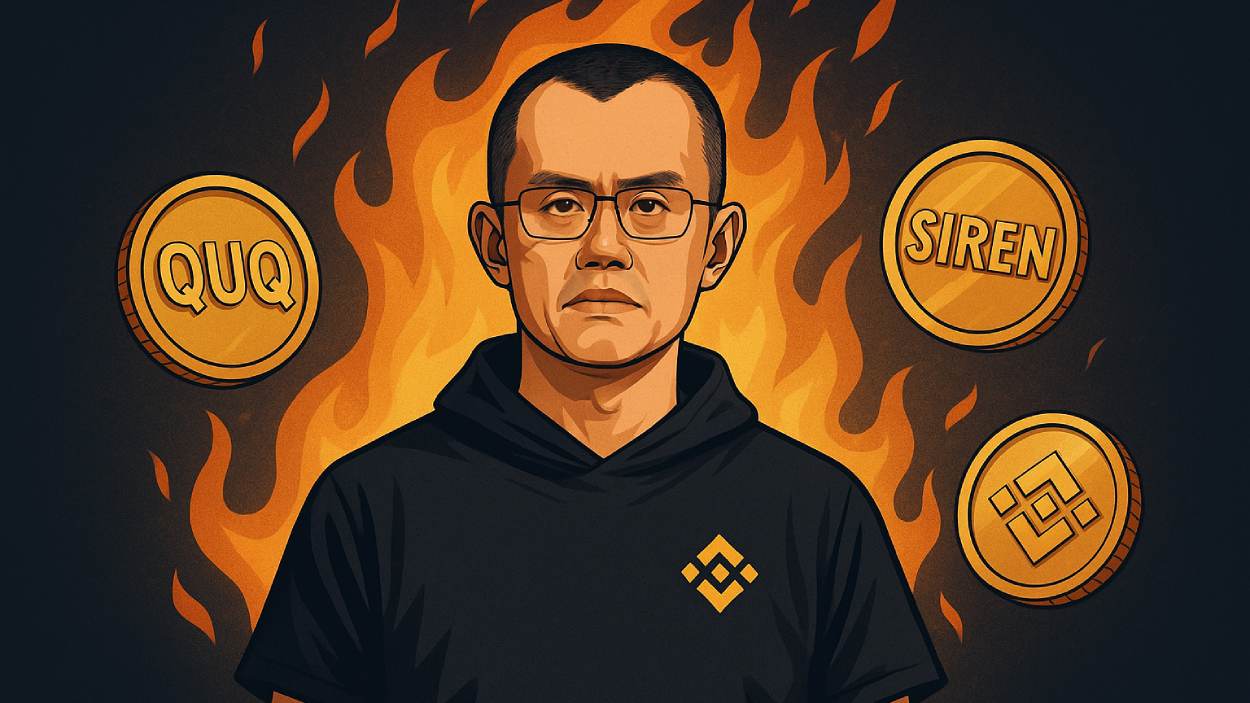A bold token purge by Binance founder Changpeng Zhao has reignited conversation around spammy crypto tactics and the challenges of maintaining wallet transparency.
Quick Summary – TLDR:
- CZ burned around $490,000 worth of unsolicited memecoins from his public donation wallet.
- Tokens involved include quq ($305K), SIREN ($142K), and BNBCARD ($43K).
- Zhao warned he might sell future tokens instead of burning them.
- Move highlights growing concerns over phishing, scams, and misleading token promotions.
What Happened?
Changpeng Zhao, better known as CZ, destroyed nearly half a million dollars’ worth of unwanted meme tokens sent to his public crypto wallet. The wallet was originally created for BNB donations, but it has become a target for token drops from smaller crypto projects trying to gain visibility. CZ publicly confirmed the burn and made it clear that his address is not an endorsement platform.
Just cleaning up the wallet. The donation address only keeps #BNB. Next time, I might choose to market sell them.
— CZ 🔶 BNB (@cz_binance) November 9, 2025
Do not send tokens to the address if you don’t want them to be sold on the market. https://t.co/nvK94tyAMu
CZ Responds to Spam Airdrops with Another Token Burn
On-chain analyst Ai Yi spotted the recent cleanup and estimated that tokens worth approximately $490,000 were burned. This included $305,000 in quq, $142,000 in SIREN, and $43,000 in BNBCARD. The tokens were sent to a burn address, effectively removing them from circulation.
This marks the second such cleanup in less than a year. Previously, CZ burned $1.6 million in Broccoli tokens and nearly $2 million in Tutorial tokens, reinforcing his position against unsolicited deposits.
CZ took to X to confirm the action, writing:
The Problem with Airdrop Spamming
The tactic of sending tokens to public wallets of influential figures has grown common in the crypto world. It is used as a marketing strategy to create the illusion of endorsement. By associating with high-profile wallets like CZ’s, developers hope to gain traction and social proof.
However, CZ is clearly pushing back. He previously explained that such tokens:
- Create unnecessary operational burden.
- Falsely imply endorsement or support.
- Clutter wallets and confuse followers.
- Could distort market perception and pricing.
Zhao has considered using automation tools to manage these tokens but noted that many of them lack proper security vetting.
Scams and Phishing Add to the Risk
The memecoin craze has fueled not only unwanted promotions but also security threats. CZ recently warned of a spike in phishing scams after the BNB Chain’s X account was hijacked. Hackers used the breach to share fake airdrop links disguised as WalletConnect prompts.
Security firm SlowMist found that one phishing domain was nearly identical to the real BNB Chain website, with just a single character difference, tricking many users into compromising their wallets.
Burn vs Sell: A Change in Strategy?
Until now, CZ has mostly chosen to burn unsolicited tokens, which permanently removes them from the ecosystem. This approach avoids influencing the market or hurting token holders. But in his recent comments, he hinted that selling the tokens on the open market may be a more effective deterrent going forward.
This represents a subtle shift in his philosophy. Back in March, CZ said he avoided selling such tokens to avoid harming holders, even when a user suggested donating the proceeds to charity. His new stance suggests he may prioritize reducing the nuisance and discouraging spam over protecting unknown token holders.
Interestingly, this contrasts with Ethereum co-founder Vitalik Buterin, who is known to sell and donate unsolicited tokens rather than burn them.
SQ Magazine Takeaway
Honestly, I think CZ did the right thing here. Spammy token airdrops are a shady marketing tactic and create confusion for the entire community. Burning the tokens sends a clear message, but the idea of selling them next time? That might finally make these spammy projects think twice before clogging high-profile wallets. I appreciate CZ’s transparency, and as someone who values clean crypto practices, it is refreshing to see him stand firm.


































































